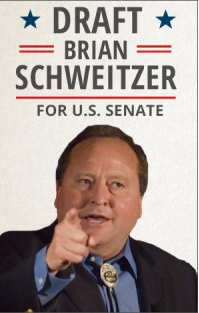
Cross-posted from The Daily Change
With the news that Sen. Max Baucus (D-MT) is retiring, the Progressive Change Campaign Committee has launched a campaign to draft former Montana Governor Brian Schweitzer (D) to run for the spot.
As of this writing. Over 15,000 Americans have signed onto the campaign, and have donated over $21,000 to a draft fund that will go to Schweitzer on Day One of his campaign.
Here's why you should join the draft campaign too -- the top 10 things that make Brian Schweitzer an awesome economic populist:
- He Unequivocally Endorses Medicare-for-All, Single Payer: Schweitzer is an advocate of expanding Medicare to all Americans, and even sought a waiver from the Affordable Care Act to allow his own state to pursue single payer. Schweitzer explained his support for Canadian-style single payer health care like so: "Imagine if you went to a gas station, and you looked over at a car with a Canadian license plate. They were paying $1 a gallon for gas, and you're paying $2. Wouldn't that make you mad? That's exactly what's happening. I'm mad for all the people in the country."
- He Calls Out Corporate Control of Our Government -- And Fights It: In an interview last year, Schweitzer said that "corporations are controlling not just our governments but our everyday lives." How many Democrats are willing to state that truth? Schweitzer also has blasted Citizens United, supports a constitutional amendment to ban corporate money, and is especially passionate about this issue since the Supreme Court struck down Montana's ban on corporate money in elections.
- He Stands Up to Big Drug Companies: Schweitzer sought a waiver from federal law to allow Montanans to buy cheaper pharmaceutical drugs from Canada. Big Pharma lobbying has made it illegal for Americans to buy this cheaper medicine from our neighbors to the north. It takes guts to stand up to an industry that spent over $200 million lobbying and $25 million in campaign contributions last year.
- He Wants to Return to The Era of Trust-Busting: In an interview last year, Schweitzer told a journalist that one of his political icons is Teddy Roosevelt, because he "took on the trusts." How many other Democrats would blatantly say we need to get back to busting up big corporate monopolies? Senator Schweitzer would help progressives take on the modern day trusts: cable companies, Internet companies, media conglomerates, and the big Wall Street banks.
- He Won't "Cower" in Front of the Military-Industrial Complex: He told a journalist last year that one of his political icons is the late Sen. Paul Wellstone (D-MN), because Wellstone wouldn't "line up and cower behind the curtains of big insurance and the military-industrial complex because of their huge campaign contributions."
- He'll Stand Up to "Oil Wars": In 2011, while President Obama was still prosecuting his troops surge, Schweitzer called on him to withdraw from Afghanistan. He was also a staunch opponent of the war in Iraq, and said in 2012, "Having been to four dozen funerals for men of Montana who effectively fought an oil-well war to protect profits for multinational oil companies and petro-dictators, I want it to stop, I don't want another generation to fight an oil war."
- During Crisis, He Holds Corporate Bad Actors Accountable: When ExxonMobil had a spill in the Yellowstone River, Schweitzer made sure were held accountable. "The clean up will be done when the state of Montana, the people of Montana, and the wildlife of Montana in that Yellowstone River decide that the cleanup is done. It won't be decided by ExxonMobil and it won't be decided by bureaucrats in Washington D.C.. When we decide the clean up is done it's done," he told Rachel Maddow. When the company refused to be transparent about the cleanup, he cut state ties to ExxonMobil's command post.
- He Is a Proud Civil Libertarian: Schweitzer signed into law a measure from the legislature objecting to the USA PATRIOT Act. He also won praise from the ACLU for rejecting the federal REAL ID program, which would've required states to share sensitive data with Washington for a national ID card program -- not surprisingly data companies like Digimarc spent $350,000 over six months to get Congress to back the program. Additionally, Schweitzer signed into law the state's first state-wide public defender program, ensuring that no one would be denied representation in the courts based on their ability to hire a lawyer.
- He Supports Fair Trade: Schweitzer's views on trade are in sync with labor unions, environmentalists, and human rights activists. "I was a critic of NAFTA, I was a critic of CAFTA and I'll be a critic of Shafta," he told the New York Times. Recall that Corporate America has lobbied for these agreements -- they spent $25 million on lobbying to pass NAFTA -- and uses them to skirt environmental and labor regulations.
- He Believes in Unions: While many governors and city officials were clashing with labor unions, Schweitzer believes in working with them. While Gov. Scott Walker (R-WI) was crushing collective bargaining rights, Schweitzer offered a defense of unions during an appearance on PBS, saying, "Every individual worker can go to their boss and negotiate any kind of deal that they want. That's what collective bargaining is all about, so that a group of people collectively have some clout. Otherwise, one by one, you could send people down the road. If they say to you, well, I'm looking for a little bit more benefit, they say, well, then you can hit the -- hit the road, Jack." He backed up his words with actions, opening up a state employee health clinic, pushing for a pay increase for state workers, and holding pro-union rallies at the capitol.
(Or
of his campaign, so he can hit the ground running.)
